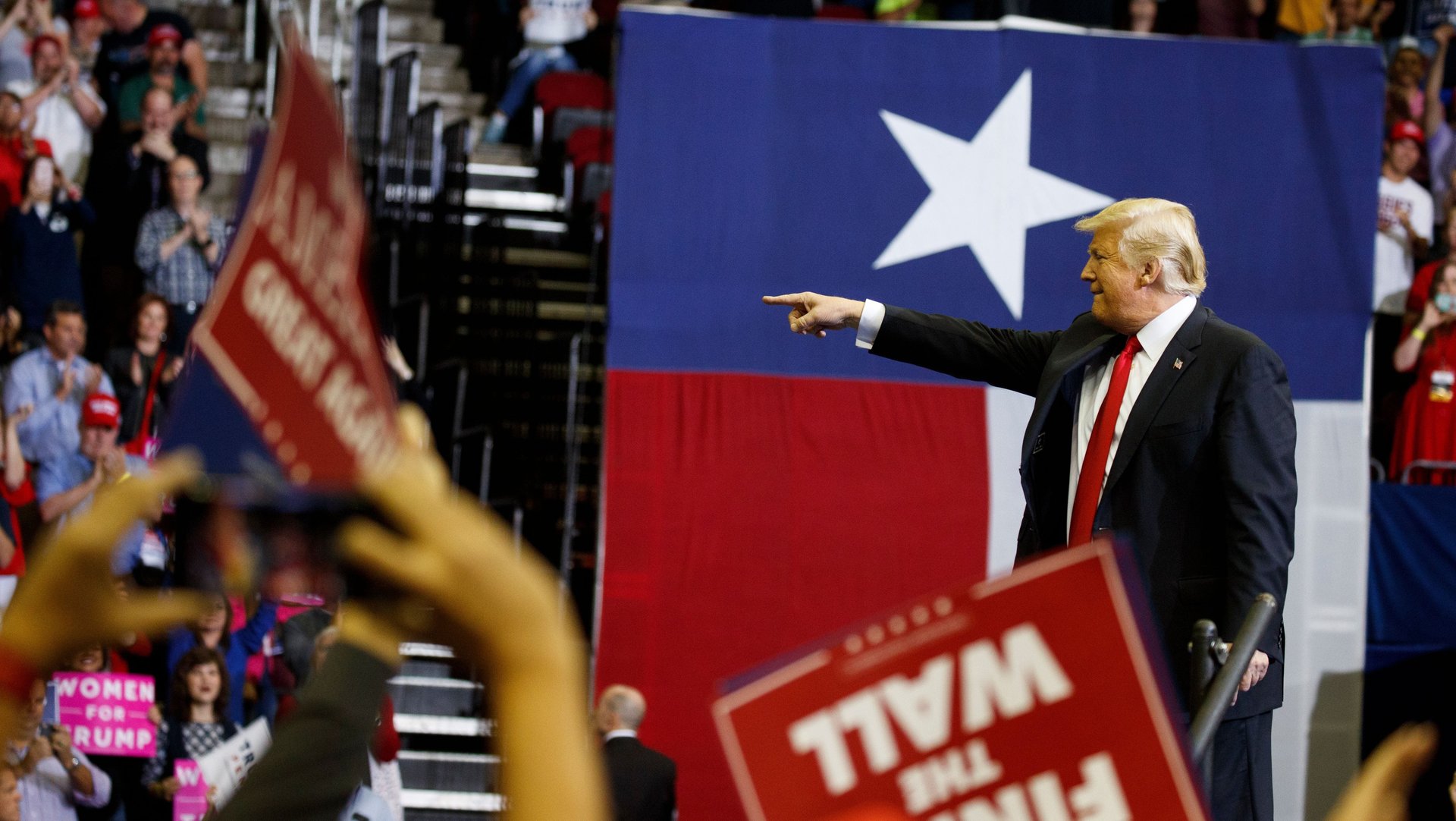The real definitions of “globalist” and “nationalist”
Donald Trump had a vocabulary lesson for the thousands of supporters who gathered at a Houston rally on Monday (Oct. 22.) for Ted Cruz, Texas’s candidate for the US Senate. He defined two terms: globalist and nationalist.


Donald Trump had a vocabulary lesson for the thousands of supporters who gathered at a Houston rally on Monday (Oct. 22.) for Ted Cruz, Texas’s candidate for the US Senate. He defined two terms: globalist and nationalist.
America is winning again. America is respected again because we are putting America first. We’re putting America first. It hasn’t happened in a lot of decades. We’re putting them first. We’re taking care of ourselves for a change folks… But radical Democrats want to turn back the clock… for the rule of corrupt, power-hungry, globalists. You know what a globalist is? You know what a globalist is? A globalist is a person that wants the globe to do well, frankly, not caring about our country so much.
And you know what, we can’t have that. You know they have a word. It sort of became old-fashioned. It’s called a nationalist, and I say really, we’re not supposed to use that word. You know what I am? I’m a nationalist, okay? I’m a nationalist. Nationalist. Nothing wrong. Use that word. Use that word.
The crowd responded with an enthusiastic chant of “USA, USA, USA, USA, USA, USA.”
But there’s a lot more behind those words than the simple definitions provided by Trump. Here’s a more in-depth look at their meaning.
“Globalist”
On the surface, the term could be taken as a stand-in for “globalization supporter.” Its origin, however, is more problematic.
It can be tracked back the Second World War. Though it was first used by a historian to describe Adolf Hitler’s expansionist ambitions, “globalist” soon started acquiring anti-Semitic connotations, according to The Atlantic. For example, in 1943, an isolationist Republican politician used”globalist” to describe colleagues who were advocating for taking in European refugees; his speech was later published in full by a group that sought to “preserve America as a Christian Nation being conscious of the fact that there is a highly organized campaign to substitute Jewish tradition for Christian tradition.”
The terms retains some of its ant-Semitic roots, experts say. Here’s former Ku Klux Klan leader David Duke, responding to a tweet by a Trump critic:
“Globalist” is also often used to describe George Soros, a figure despised by both white supremacists and the alt-right. He is Jewish.
Like all dog-whistling, the term is intentionally vague. However, the word’s history is intertwined with conspiracy theories that have accused Jews of plotting to take over the world since the early 1900s. (Whether Trump is familiar with that history or not, he and other current and former members of his cabinet have called Jewish members of the team, such as former National Economic Council director Gary Cohn and senior advisor Jared Kushner, globalists.)
Alt-right commentators such as Alex Jones—who calls himself “Globalist Enemy Number One”—have expanded the globalist definition to rail against LGTBI rights, Hollywood, China, and pretty much anyone they don’t agree with.
“Nationalist”
The standard definition of nationalism is “loyalty and devotion to a nation.” It sounds like patriotism, which is “love for or devotion to one’s country,” per Merriam Webster.
But the definition of nationalism also includes “exalting one nation above all others and placing primary emphasis on promotion of its culture and interests as opposed to those of other nations or supranational groups.” This exclusionary aspect is not shared by patriotism.
Nationalism takes a more discriminatory tone when Trump positions nationalism as the opposite of the anti-Semitic “globalist.” Add “white” to “nationalism,” and you get the name of a movement that openly promotes the idea that one race is superior to others.
After taking a deep dive into what the term means politically—including by reading George Orwell’s Notes on Nationalism—the Cato Institute’s Alex Nowrasteth explained the difference between the two:
Patriotism is love of country while nationalism is love of country combined with dislike of other countries, their peoples, or their cultures. Nationalism also extends to dislike of fellow citizens who are different, which is why nationalists frequently support nation-building campaigns of government schooling to assimilate citizens to a state-determined norm, national languages, and other means of creating ethnic, religious, or other forms of uniformity.
Nowrasteth’s also found that nationalism can lead well beyond discrimination—to imperialism, for example, and mass killings. After communist regimes, nationalist governments like Chiang Kai-shek’s Nationalist government in China and the Young Turk’s movement in Turkey have killed the most people, according to his research.